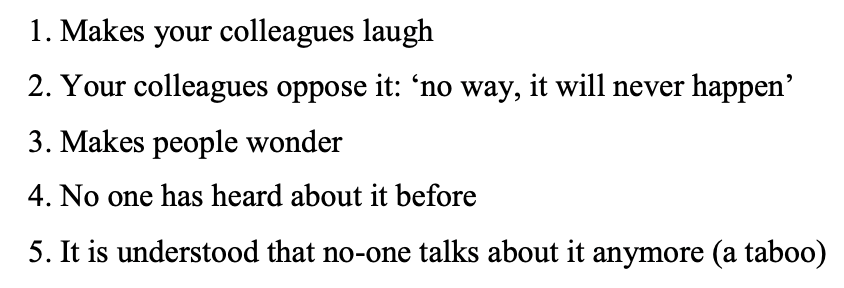Searching for a Sign or a Signal
1 March 2021
As I’m writing this, it’s St David’s Day in Wales, this morning I sent my little girl off to School in her Welsh Lady costume and felt compelled to go into the Supermarket (for the first time in a year) to buy some Daffodils (deemed Essential Items for Welsh people). I did not linger. I’m now listening to the First Minister Mark Drakeford’s Coronavirus Briefing where he thanked everyone for living by St David’s adage “Gwneud y pethau bach mewn bywyd” which translates as “doing the little things in life”.
How I have lived in Wales for 40 years (University days aside) and never heard this phrase in connection to St David is beyond me, but my discovery of it is brilliant timing for the writing of this blog because what I’d like to focus on today is the power of the little things.
I’m working with some colleagues in the Business School to examine the applicability of another kind of organizational ‘improvement’ methodology (something other than lean! I know!) that of HRO or Highly Reliable Organisations. I’m really enjoying learning about something new (well new to me) and, as ever, delighting on how these new insights build and connect to the mental picture of improvement that I have created in my mind over time.
One element of HRO that has really intrigued me is that of the importance of ‘weak signals’. Elina Hiltunden, in her Helsinki School of Economics thesis (I will always be blown away by how much amazing information lies in Doctoral Thesis and Masters Dissertations – how much knowledge there is in the world!) describes a weak signal as “the first sign of an emerging issue” and that they are important because they are telling you something important about your organisation. Listening and being alert to a weak signal could let you know about a frustration point for a customer, which could also be thousands of customers (unsaid) frustration. A weak signal might also give you a clue about how you need to innovate, either a product or service, in order to better please your customers or to capture a new market. It could be a quality concern that, if left unchecked, could turn into something catastrophic for the organisation.
You could also just look to your and your colleagues experiences of the organisation to try to discern them. Hiltunden suggests that a good way to start thinking about them is to examine the chats around the work coffee table (remember those?!) and if there is something about your work that:

Then these should be more carefully considered, not brushed aside, but reflected upon to see if they could give you a ‘clue for change’.
The concepts of weak signals appeals to me in a number of different ways. Firstly, I’m very aware of the importance of going to ‘where the work happens’ (in lean – the ‘gemba’) to understand what improvements are required and also to understand what customers want and need from the organisation. How much can be achieved by connecting an organisation’s complaints process to their improvement process for example. How much can be learned from a Manager putting on a headset and just listening to customer calls and how employees respond to those customer queries. Often, just naming a concept can bring it to the fore in people’s minds, so how interesting to think what might be uncovered when somebody starts interacting with customers, or with their complaints, with a view to looking out for a ‘weak signal’…..what new important information this might give the organisation.
Another reason why this appeals to me is because of my own experiences of services because I encounter them with a particularly annoying air of superiority given my improvement knowledge. I’m sorry. When something bugs me, and I need to complain, I find it very difficult not to say ‘I do know something about this you know, I work for a BUSINESS SCHOOL and am a specialist in Service Improvement ACTUALLY’. I (mostly) manage to restrain myself. The main reason that I want to say this is not because I’m desperate to show off, honest, its because I know that what I am telling them SHOULD be acted upon. That the information that I am providing them with is seriously useful. Just knowing now that my tweets or my emails are actually ‘weak signals’ has made me feel better about my helpful messages, if only all organisations appreciated them as such. SNIFF!
You’ll know the organisations that take these things seriously and the service experience that they offer is all the better for it. They’re organisations where it is relatively easy to talk to another human being. Where you can find information about how to make a complaint within a couple of clicks. They’re companies that listen and who care about the little things. And as St David knew, focussing on all of the little things can seriously add up.
- Working Smarter and Harder to Overcome Friction
- Mesmerising Mnemonics
- Recharging Batteries
- Marketing Magic
- What’s My Job Again?
- The Reports Have Gone to Her Head
- Cross Stitch Standards and Creativity
- Hefin David and the Aeroplane Arms
- Hankering for a Handbook
- Window of Light
- Defensive Organising
- McMullin’s Tandem of Co-Production
- The Joy of John Parry-Jones
- The Perils of Disappointment
- The Shield of Shame
- Customer Care and Organisation Innovation
- Hooray for Humanity!
- Angry Lemons
- Double Meanings
- Ticketing Masterplans
- When will it all end …
- Lifetime Loyalty and Taylor Swift
- Looking at Things Differently
- Networking Noodles
- Addicted to Truth
- Designs on Service Design
- The Multiple Joys of Universal Design
- Hungry Cultures
- Event Lean
- The Traffic Analogy
- Moving on Up
- Rosé Cava Revolution?
- Powerpoint Sneaky Lean
- Writing about Writing
- ChatGPT Response: Exploring the Art of Expression: Unveiling the Magic of Writing in the Style of Sarah Lethbridge
- Help to Grow Coldplay Style
- Caring IS Everything!
- Institutional Flapping
- “Just Do the Next Right Thing”
- Trust Thermoclines
- February 2026 (2)
- December 2025 (1)
- November 2025 (1)
- October 2025 (2)
- September 2025 (1)
- August 2025 (2)
- July 2025 (1)
- June 2025 (1)
- April 2025 (1)
- March 2025 (2)
- February 2025 (1)
- January 2025 (1)
- December 2024 (1)
- November 2024 (1)
- October 2024 (1)
- September 2024 (1)
- July 2024 (2)
- June 2024 (1)
- May 2024 (1)
- March 2024 (1)
- February 2024 (2)
- December 2023 (2)
- October 2023 (2)
- September 2023 (1)
- July 2023 (3)
- June 2023 (1)
- May 2023 (1)
- April 2023 (1)
- March 2023 (1)
- February 2023 (1)
- January 2023 (1)
- November 2022 (1)
- October 2022 (2)
- August 2022 (2)
- July 2022 (1)
- May 2022 (2)
- April 2022 (1)
- February 2022 (1)
- January 2022 (1)
- December 2021 (2)
- November 2021 (1)
- October 2021 (1)
- September 2021 (1)
- August 2021 (1)
- July 2021 (1)
- May 2021 (2)
- April 2021 (1)
- March 2021 (1)
- January 2021 (1)
- December 2020 (1)
- October 2020 (3)
- August 2020 (1)
- June 2020 (2)
- April 2020 (1)
- March 2020 (1)
- February 2020 (1)
- December 2019 (2)
- October 2019 (1)
- September 2019 (1)
- August 2019 (1)
- July 2019 (1)
- June 2019 (1)
- February 2019 (3)
- October 2018 (1)
- September 2018 (1)
- March 2018 (10)
- April 2016 (1)
- January 2015 (3)
- July 2014 (9)
- September 2013 (1)
